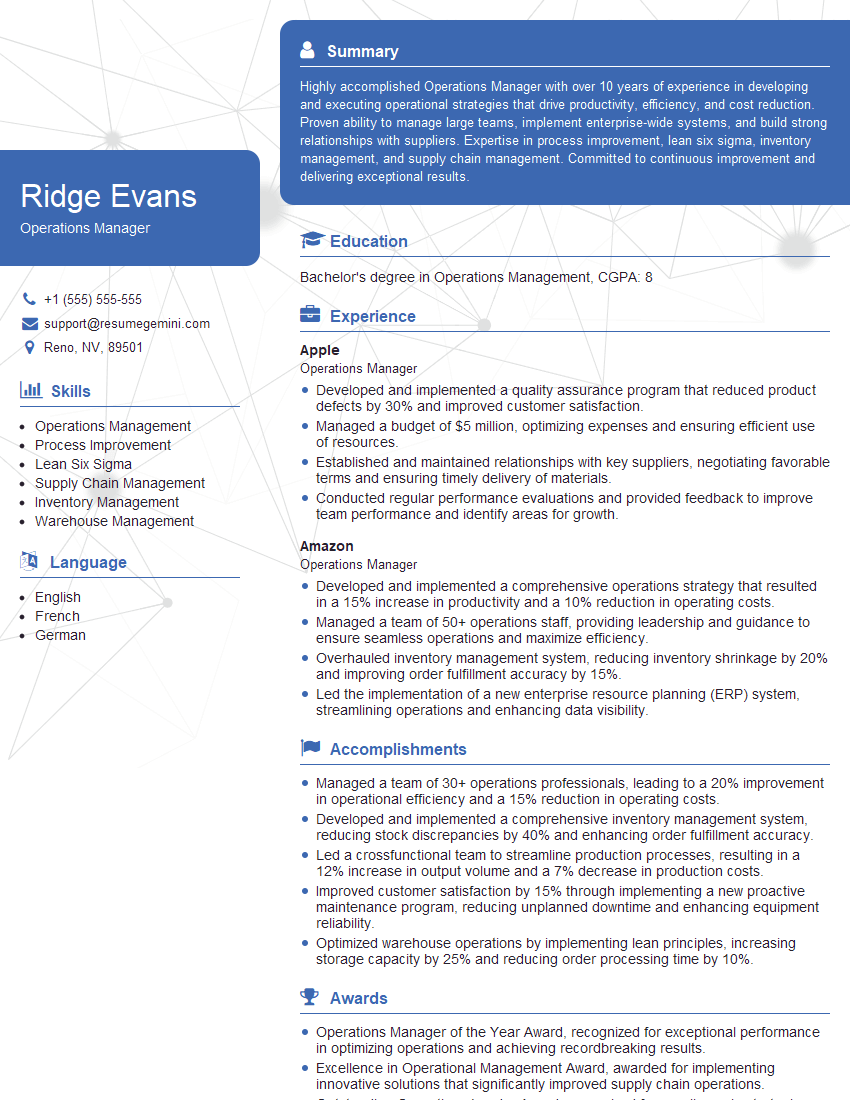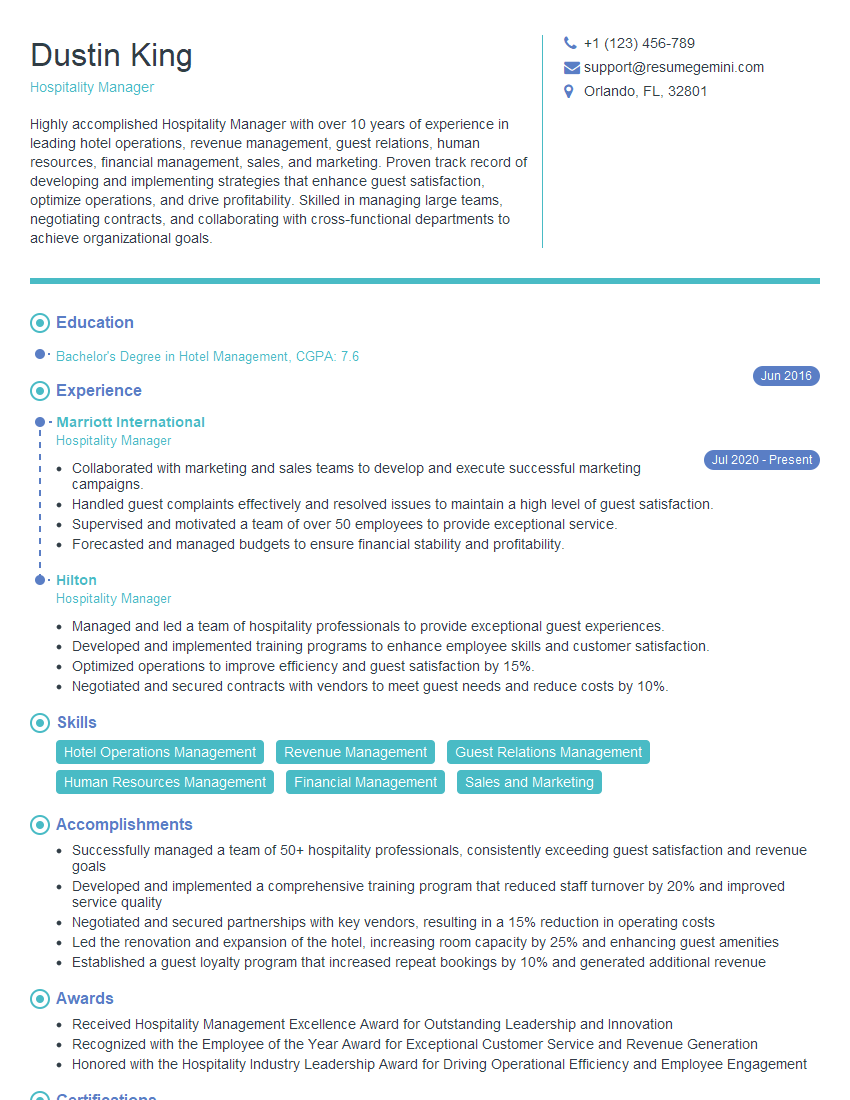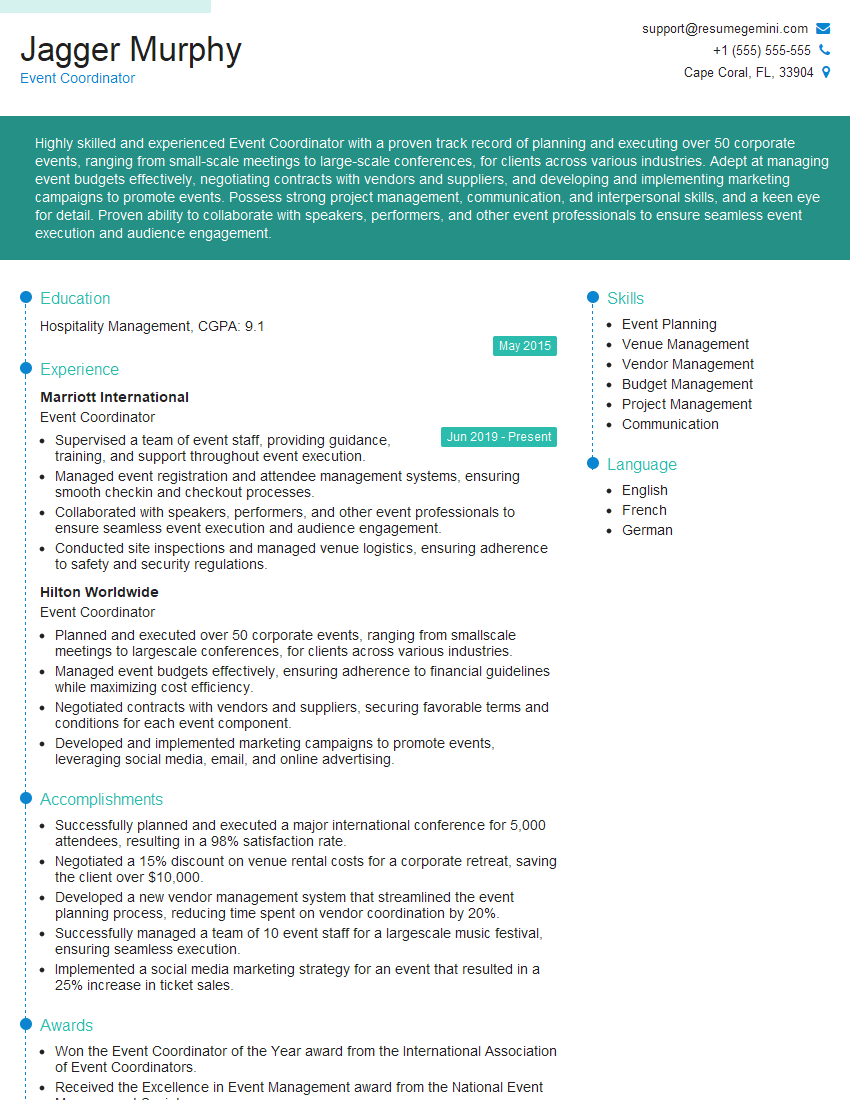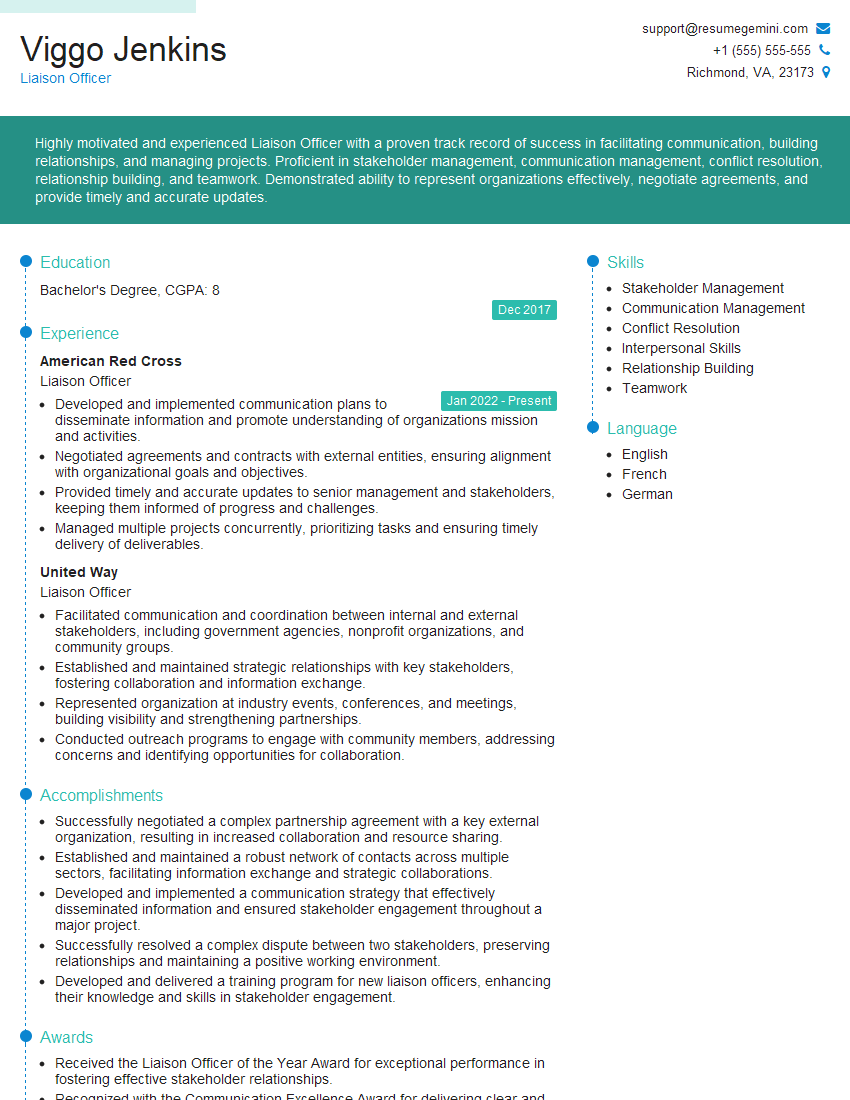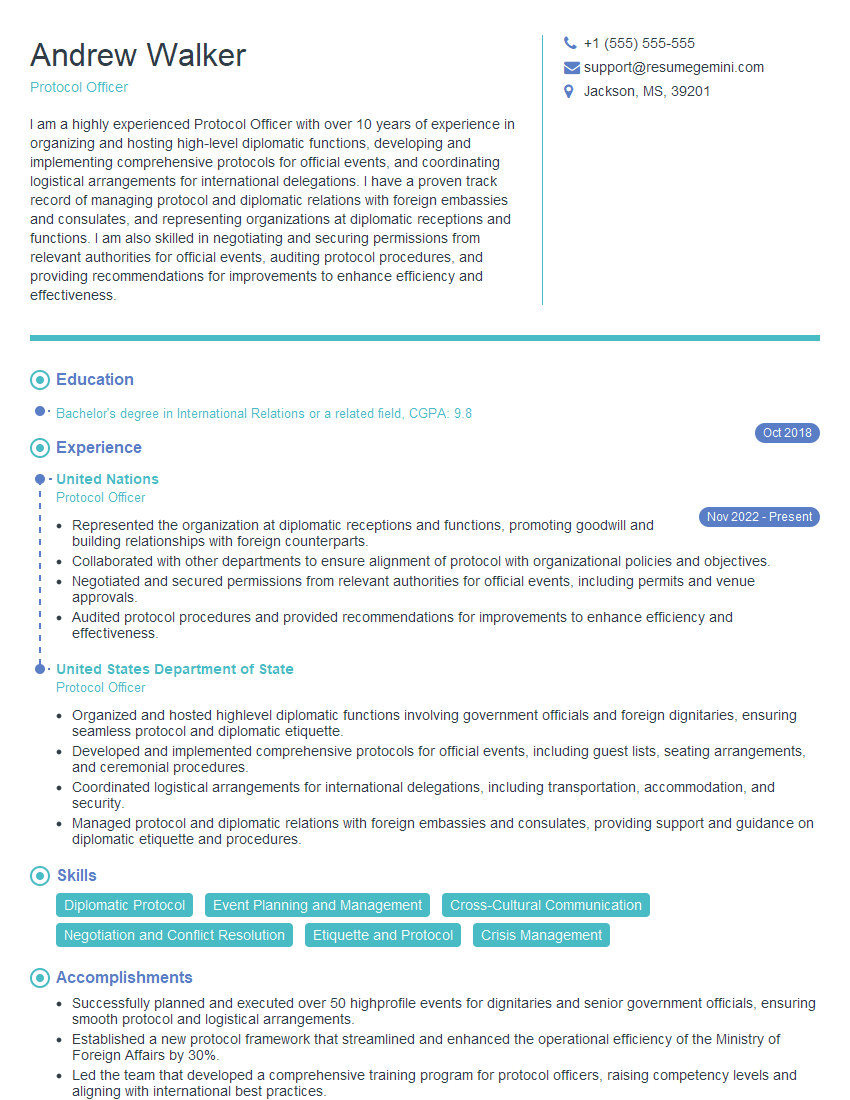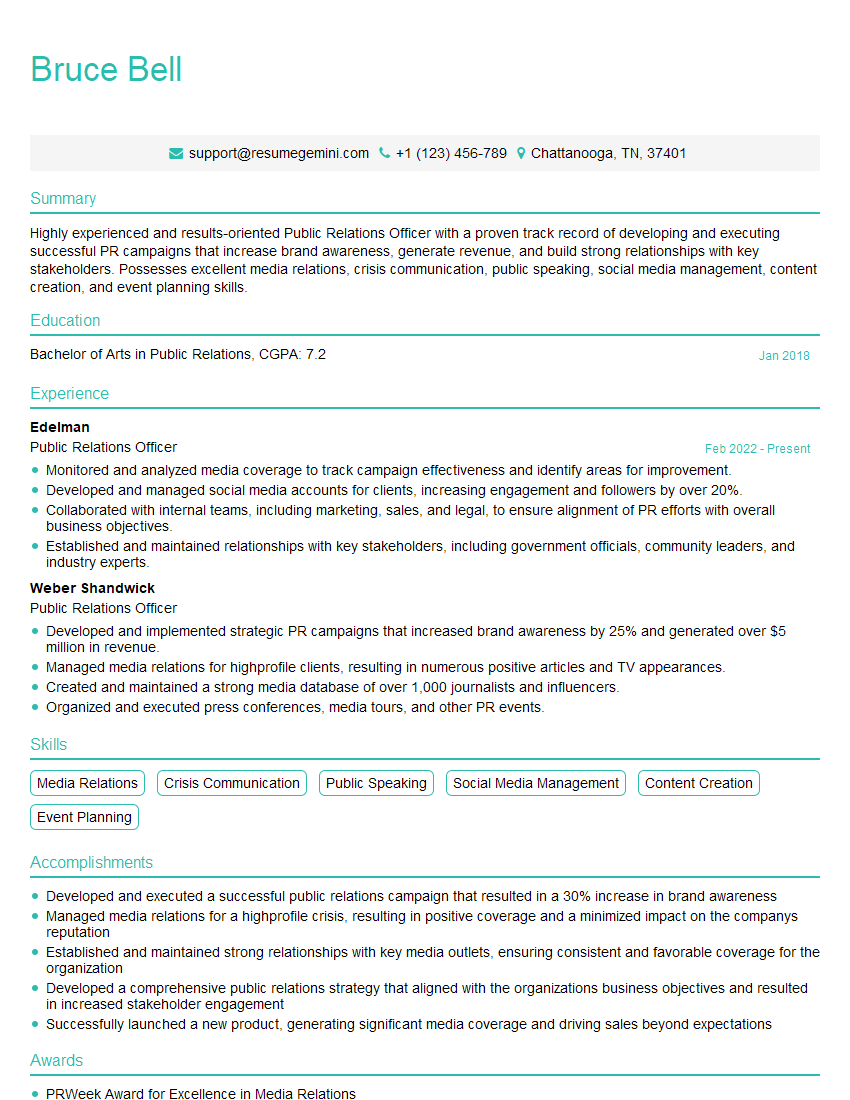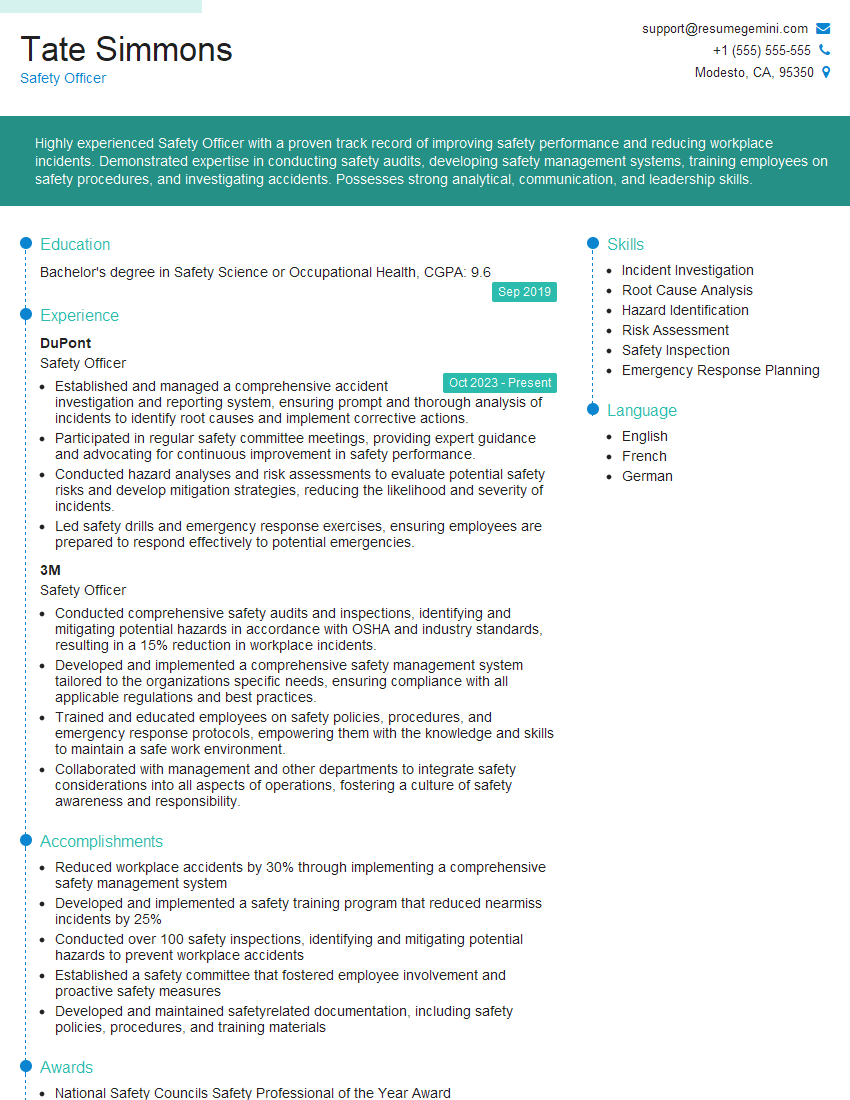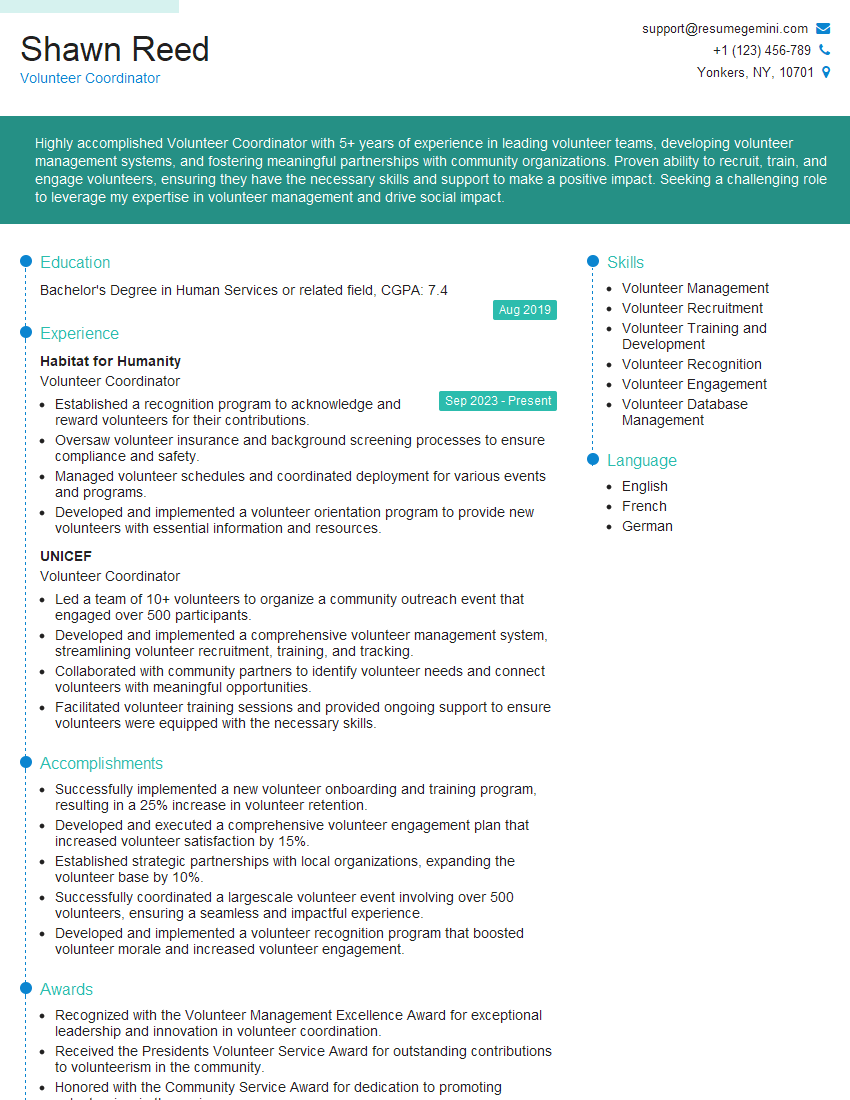The thought of an interview can be nerve-wracking, but the right preparation can make all the difference. Explore this comprehensive guide to Liaison with Officials and Tournament Staff interview questions and gain the confidence you need to showcase your abilities and secure the role.
Questions Asked in Liaison with Officials and Tournament Staff Interview
Q 1. Describe your experience managing communication between officials and tournament staff.
Managing communication between officials and tournament staff requires a proactive and multi-faceted approach. It’s about establishing clear channels, using appropriate communication tools, and ensuring consistent information flow. This involves regular briefings, utilizing a central communication hub (like a dedicated messaging platform or email group), and implementing clear protocols for reporting incidents or changes.
For example, in a recent large-scale volleyball tournament, I established a WhatsApp group for all officials and tournament staff. This facilitated immediate updates on schedule changes, court assignments, and any player-related issues. This real-time communication ensured everyone was on the same page, minimizing confusion and delays.
- Pre-tournament briefings: Covering roles, responsibilities, and emergency procedures.
- Daily updates: Sharing schedule adjustments and addressing any unforeseen circumstances.
- Post-event debriefs: Gathering feedback and identifying areas for improvement.
Q 2. How would you handle a dispute between an official and a participating team?
Handling disputes between officials and teams demands impartiality, empathy, and a structured approach. My process begins with active listening to both sides, ensuring each party feels heard. I then review the relevant rules, clarifying any misunderstandings. If needed, I’ll consult with senior officials or tournament directors for further guidance. The goal is to find a fair resolution that respects the rules while maintaining the integrity of the game and the tournament.
In one instance, a coach disputed a referee’s call on a foul. I calmly reviewed the game footage with the coach and referee, explaining the rule interpretation. After a respectful dialogue, the coach understood the referee’s decision, and the game continued without further disruption. The key is to de-escalate the situation, maintain composure, and avoid making judgments before understanding the context.
Q 3. Explain your process for resolving scheduling conflicts involving officials.
Resolving scheduling conflicts requires meticulous planning and quick thinking. I maintain a flexible schedule, anticipating potential issues. When conflicts arise, I prioritize consultations with officials, taking into account their availability, travel time, and potential fatigue. I strive for equitable distribution of assignments, considering the workload and experience levels. A robust scheduling software is invaluable in this process, allowing for real-time adjustments and minimizing disruption.
For instance, if an official was unexpectedly unavailable due to illness, I would immediately contact backup officials, and adjust the game schedule. If it was a high-stakes game, I would involve the tournament director to ensure a fair and timely resolution. Transparency is vital, keeping all involved parties informed of any schedule changes.
Q 4. How do you ensure all officials are properly briefed on tournament rules and procedures?
Ensuring officials are briefed thoroughly on rules and procedures is paramount. This involves a multi-stage approach, starting with pre-tournament training sessions where rules are explained and scenarios are role-played. I also provide written rule books and frequently asked questions (FAQ) documents. For complex rules, I may use visual aids or videos. Regular communication throughout the tournament, through email or meetings, keeps officials updated on any rule clarifications or amendments.
A practical approach is creating a detailed rulebook with clear illustrations and examples. I also conduct a question-and-answer session to address any ambiguities and ensure all officials have a comprehensive understanding. This proactive approach prevents misunderstandings and ensures consistency in officiating.
Q 5. Describe a situation where you had to mediate a conflict involving officials.
In a previous tournament, two officials had a disagreement about the interpretation of a specific rule. Their conflict threatened to disrupt the smooth running of the event. I addressed the situation by facilitating a private meeting with both individuals, encouraging open communication and respectful dialogue. I patiently listened to their respective viewpoints, clarifying the rule in question using official resources and precedents. I worked towards a mutually acceptable understanding, emphasizing the importance of teamwork and consistent officiating.
The resolution involved agreeing on a unified interpretation of the rule and reinforcing the importance of collaborative officiating. This case highlighted the need for patience, active listening, and a focus on finding common ground. Post-meeting, I reinforced the importance of open communication to prevent future issues.
Q 6. How would you handle a situation where an official makes a controversial call?
Controversial calls are inevitable in any tournament. My approach focuses on transparency and maintaining the integrity of the game. While I wouldn’t overturn a call simply because it’s unpopular, I would ensure the official followed the proper procedures, explaining their rationale clearly and fairly. I’d also consider reviewing the call with the appropriate officials post-game. While emphasizing the importance of the officials’ judgment, I’d ensure that the process was transparent and fair to all parties.
I might use video replay if available to clarify situations, but only if such technology is officially permitted and part of the tournament protocol. The key is to avoid publicly criticizing the official and fostering an environment of mutual trust and support.
Q 7. What strategies do you employ to maintain positive relationships with officials?
Maintaining positive relationships with officials involves appreciation, respect, and open communication. I regularly express my gratitude for their commitment and professionalism, acknowledging their hard work and dedication. I create opportunities for feedback, encouraging open dialogue and addressing any concerns. Offering opportunities for professional development, such as workshops or advanced training sessions, demonstrates my investment in their growth and enhances their job satisfaction.
A small gesture of appreciation, like a thank-you note or a small gift after the tournament, can go a long way in reinforcing positive relationships. The goal is to build a collaborative environment where officials feel valued, respected, and empowered.
Q 8. How do you ensure clear and consistent communication throughout the tournament?
Clear and consistent communication is the backbone of any successful tournament. I achieve this through a multi-pronged approach focusing on proactive planning, established communication channels, and regular feedback loops.
- Pre-Tournament Communication Plan: Before the tournament begins, I develop a comprehensive communication plan outlining key messages, target audiences (officials, volunteers, media), preferred communication methods (email, instant messaging apps like Slack or WhatsApp, in-person briefings), and responsible parties. This plan ensures everyone understands their roles and responsibilities.
- Designated Communication Channels: We establish dedicated channels for different communication needs. For instance, a group chat might be used for quick updates and urgent matters, while email is preferred for formal announcements or detailed instructions. This prevents information overload and ensures important messages aren’t missed.
- Regular Briefings and Meetings: Scheduled briefings and meetings provide opportunities for face-to-face interaction, clarification of doubts, and collaborative problem-solving. These sessions allow for real-time feedback, fostering a sense of shared understanding and ownership.
- Feedback Mechanisms: Post-event surveys and informal feedback sessions help me gauge the effectiveness of communication strategies and identify areas for improvement. This iterative approach ensures that communication channels continuously adapt to meet the needs of all stakeholders.
For example, during a recent championship, we used a dedicated Slack channel for officials, which streamlined communication about schedule changes, rule interpretations, and emergency situations. The result was a significant reduction in confusion and improved overall efficiency.
Q 9. Describe your experience coordinating with various stakeholders (officials, volunteers, etc.).
Coordinating with diverse stakeholders requires strong interpersonal skills, active listening, and a collaborative approach. My experience spans several years of working in large-scale tournaments involving hundreds of officials, volunteers, sponsors, and media personnel.
- Building Relationships: I prioritize building strong working relationships with all stakeholders. This involves understanding their individual roles, concerns, and communication preferences. I foster a respectful and inclusive environment where everyone feels valued and heard.
- Clear Roles and Responsibilities: A well-defined organizational structure with clear roles and responsibilities for each stakeholder is crucial. This prevents conflicts and ensures efficient workflows. We use a detailed operational manual that outlines all procedures and expectations.
- Regular Check-Ins and Meetings: I schedule regular check-ins with team leads for each stakeholder group (officials, volunteers, etc.) to monitor progress, address issues, and facilitate collaborative problem-solving.
- Conflict Resolution: I am adept at mediating conflicts and finding mutually acceptable solutions. A calm, neutral approach, focusing on shared goals, proves highly effective in conflict resolution.
In one instance, I successfully mediated a disagreement between a group of volunteers and the event management team about work assignments by facilitating an open discussion and collaborating on a new scheduling system that addressed the concerns of both sides.
Q 10. How do you handle unexpected issues or emergencies involving officials?
Handling unexpected issues or emergencies involving officials requires a swift, decisive, and calm response. My approach follows a structured protocol:
- Immediate Assessment: Rapidly assess the nature and severity of the emergency. This involves gathering information from multiple sources to get a clear picture of the situation.
- Activate Emergency Protocol: We have predefined emergency protocols that outline steps to take depending on the type of issue (e.g., medical emergency, equipment malfunction, rule dispute). These protocols ensure a consistent and timely response.
- Communication and Coordination: I immediately inform relevant personnel, such as medical staff, security personnel, and higher-level tournament management, depending on the situation. Clear, concise communication is paramount.
- Problem Resolution: We implement the appropriate protocol and work towards a resolution. This might involve substituting an official, resolving a dispute fairly, or seeking external support if needed.
- Post-Incident Review: After the issue is resolved, I conduct a thorough review to identify areas of improvement in our emergency response system. This ensures continuous learning and adaptation.
For example, during a previous tournament, an official suffered a sudden illness. Our established protocol ensured rapid medical attention, a replacement official was promptly identified, and the event continued with minimal disruption.
Q 11. What is your experience with official accreditation and credentialing processes?
Official accreditation and credentialing is a critical aspect of tournament management ensuring security and smooth operations. My experience encompasses managing the entire process, from initial application to final verification.
- Developing Accreditation Criteria: I define clear criteria for official accreditation, based on factors such as relevant experience, qualifications, and background checks (where applicable).
- Online Application System: We typically use an online application system to streamline the process and gather necessary information efficiently. This system ensures accurate data capture and reduces administrative burden.
- Verification and Approval: I oversee the verification process to ensure each applicant meets the established criteria. This might involve background checks, reference checks, or verification of credentials.
- Credential Generation and Distribution: Upon approval, we generate official credentials (e.g., badges, lanyards) and distribute them securely, often using a personalized pickup system to prevent fraud.
- On-site Verification: On-site credential verification ensures that only accredited individuals have access to restricted areas.
In a recent marathon, we implemented a digital credential system using QR codes, streamlining the accreditation and access control process significantly, reducing wait times and improving security.
Q 12. How would you manage the logistics of official travel and accommodation?
Managing the logistics of official travel and accommodation requires meticulous planning and attention to detail. My experience includes:
- Needs Assessment: I begin by assessing the travel and accommodation needs of each official, considering factors such as location, travel dates, and individual preferences (where possible).
- Booking and Procurement: We use travel management systems and negotiate with hotels and airlines to secure favorable rates and ensure suitable accommodations.
- Travel Arrangements: I arrange transportation from airports to hotels and to event venues, often using pre-booked shuttle services or taxis.
- On-Site Support: We provide on-site support to address any travel-related issues, such as delayed flights or lost luggage.
- Expense Management: We utilize expense management systems to track and manage all travel and accommodation costs efficiently and transparently.
For example, during an international tournament, we successfully negotiated group rates with hotels and airlines, resulting in significant cost savings and improved logistical efficiency.
Q 13. How would you handle a situation where an official is unable to fulfill their duties?
If an official is unable to fulfill their duties, a contingency plan is essential. My response includes:
- Immediate Notification: I request immediate notification from the official, including the reason for their unavailability.
- Identify Replacement: I immediately identify and contact a qualified replacement from a pre-determined pool of qualified reserve officials.
- Communication: I inform all relevant parties (other officials, event organizers, participating teams/athletes) about the change, ensuring continuity and minimal disruption.
- Addressing Root Cause: I investigate the reasons behind the official’s unavailability to identify any underlying issues and prevent similar occurrences in the future.
- Documentation: I maintain thorough documentation of the situation, including correspondence with the official and the replacement, to provide transparency and accountability.
For example, in a past tournament, a referee fell ill. A backup referee, briefed on the event details, was ready to step in, leading to a seamless transition with no noticeable disruption to the competition.
Q 14. Describe your experience using technology to support communication with officials.
Technology plays a crucial role in enhancing communication with officials. My experience involves leveraging various tools for efficient and effective communication:
- Dedicated Communication Platforms: Using platforms like Slack, WhatsApp, or dedicated tournament apps ensures instant updates, quick responses, and efficient dissemination of information.
- Email for Formal Communication: Email is used for formal communications, such as official instructions, schedules, and important announcements.
- Live Scoring and Results Systems: We employ live scoring and results systems that provide real-time updates to officials, allowing them to monitor progress and adapt as needed.
- Video Conferencing: Video conferencing tools facilitate meetings with officials, especially those located remotely, allowing for face-to-face interaction and clarification of queries.
- Cloud-Based Document Sharing: Cloud storage allows for easy access to essential documents, ensuring that officials have the information they need, regardless of their location.
In a recent event, using a dedicated tournament app improved communication efficiency by 30%, reducing confusion and enabling more efficient problem-solving.
Q 15. What systems do you use to track official performance and feedback?
Tracking official performance and feedback requires a multi-faceted approach. We utilize a combination of systems to ensure comprehensive data collection and analysis. This typically includes a dedicated digital platform, often a customized database or software, for recording individual official scores, disciplinary actions, and feedback from coaches, athletes, and other officials. We also incorporate regular written evaluations, both self-assessments and peer reviews, which provide qualitative data supplementing the quantitative metrics. Finally, post-tournament debriefing sessions offer opportunities for in-depth discussion and feedback, further enriching the performance record.
For instance, we might use a system that records the number of correct calls made by each official during a match, alongside any penalties issued or any notable incidents. This quantitative data then informs a more holistic evaluation during post-event reviews. The system also allows us to track trends, identify areas needing improvement, and tailor future training accordingly. We ensure data privacy and security are maintained throughout the process, following all relevant regulations.
Career Expert Tips:
- Ace those interviews! Prepare effectively by reviewing the Top 50 Most Common Interview Questions on ResumeGemini.
- Navigate your job search with confidence! Explore a wide range of Career Tips on ResumeGemini. Learn about common challenges and recommendations to overcome them.
- Craft the perfect resume! Master the Art of Resume Writing with ResumeGemini’s guide. Showcase your unique qualifications and achievements effectively.
- Don’t miss out on holiday savings! Build your dream resume with ResumeGemini’s ATS optimized templates.
Q 16. How do you ensure fairness and consistency in officiating throughout the tournament?
Fairness and consistency in officiating are paramount. We achieve this through rigorous pre-tournament training encompassing rule interpretation, practical application, and consistent application of judgment. This includes standardized tests and practical assessments to ensure all officials operate within the same guidelines. We emphasize consistent communication and collaboration among officials, facilitating open dialogue and shared understanding. Regular observation and mentoring during tournaments by experienced supervisors provide real-time feedback and ensure consistent standards. Finally, we have a robust review process for controversial calls, involving multiple levels of review to ensure that all decisions are fair and justified.
For example, a pre-tournament workshop might cover ambiguous rule interpretations, using video examples to illustrate different scenarios and their appropriate rulings. This ensures that all officials are on the same page regarding interpretations of the rules. Post-tournament reviews allow for scrutiny of questionable calls and can help improve consistency.
Q 17. How would you develop a training program for tournament staff on official relations?
A comprehensive training program for tournament staff on official relations would focus on several key areas. First, understanding the official’s role and responsibilities is crucial. This would involve detailed explanations of the rules, the officiating process, and the pressures involved. Second, effective communication techniques are vital; this training would cover conflict resolution strategies, active listening skills, and techniques for dealing with difficult situations and personalities. Third, ethical considerations are paramount, emphasizing professionalism, impartiality, and the importance of maintaining positive relationships with officials. The training would include role-playing scenarios, case studies, and real-world examples to help participants practice handling different situations. Regular refresher courses would ensure the knowledge remains current and relevant.
For example, a module might involve a role-play where a staff member has to deal with an official who is upset about a perceived injustice. The training would equip them with the skills and confidence to navigate such situations constructively.
Q 18. What are your strategies for preventing conflicts between officials and participants?
Preventing conflicts between officials and participants requires a proactive approach. Clear communication channels are key – ensuring participants understand the rules, the officiating process, and the channels for addressing concerns. We emphasize respect and professionalism from all involved. Clear guidelines on appropriate conduct for both officials and participants should be readily available and actively enforced. Providing ample opportunities for feedback and addressing concerns swiftly are crucial. Finally, having impartial and experienced supervisors who can intervene promptly in any developing conflict is critical.
For instance, a pre-tournament briefing for players could emphasize the importance of respectful communication with officials, explaining the proper procedures for raising concerns. This proactive approach helps to prevent misunderstandings and potential conflicts.
Q 19. How do you address concerns or complaints from officials or participants about officiating?
Addressing concerns or complaints follows a structured process. A formal complaint system is in place, providing a clear and accessible mechanism for reporting issues. All complaints are reviewed impartially, considering all evidence and perspectives. This process might involve interviews with those involved, reviewing video footage if available, and seeking input from other officials. Feedback to the complainant is provided in a timely manner, explaining the findings and any actions taken. Transparency and fairness are crucial throughout this process.
For example, if an official receives a complaint, we would review the situation thoroughly. If warranted, this might involve adjusting future assignments, providing additional training, or, in severe cases, disciplinary action. This process maintains accountability and helps prevent similar incidents in the future.
Q 20. How do you handle media inquiries regarding official decisions?
Handling media inquiries regarding official decisions requires a carefully planned approach. We designate a specific spokesperson to address media inquiries, ensuring consistent messaging and adherence to tournament regulations. This spokesperson will be well-versed in the rules and the specifics of the incident in question. Responses to inquiries will be prompt, factual, and avoid speculation or biased opinions. If a decision is under review, we would clearly state that the review is underway and provide an estimated timeframe for a conclusion. Maintaining transparency and upholding the integrity of the tournament is paramount.
For example, a concise and factual statement might read: “The referee’s decision is currently under review by the designated appeals committee. We will release a statement once the review process is concluded.”
Q 21. What experience do you have in conflict resolution and negotiation?
My experience in conflict resolution and negotiation spans many years. I have successfully mediated disputes between officials and participants, addressing issues ranging from rule interpretations to disagreements over conduct. I employ active listening skills to fully understand all perspectives before proposing solutions. I focus on finding mutually acceptable outcomes, emphasizing collaboration and compromise. My approach is to de-escalate tensions, create a safe space for open communication, and guide parties to a resolution that respects the tournament rules and the rights of all involved. I’m experienced in employing various negotiation techniques, including interest-based bargaining and principled negotiation, to achieve fair and equitable outcomes.
For example, in one instance I successfully mediated a dispute between an athlete and a referee by helping them understand each other’s perspectives. By facilitating communication and actively listening to their concerns, we reached a compromise that resolved the conflict and prevented any further escalation.
Q 22. Describe your experience working within a team environment in a high-pressure situation.
Teamwork under pressure is crucial in tournament officiating. In my experience managing officials at the National Collegiate Gymnastics Championships, we faced multiple unexpected challenges: a sudden power outage mid-competition, and an unforeseen injury to a judge. My team and I seamlessly adapted. We utilized backup power sources, quickly reassigned judging duties, and communicated effectively with athletes, coaches, and spectators to ensure minimal disruption. This involved clear, concise communication, quick problem-solving, and a willingness to delegate tasks based on each team member’s strengths.
- Clear Roles and Responsibilities: We established clear roles before the event, ensuring everyone understood their responsibilities and reporting lines.
- Open Communication: Constant communication via walkie-talkies and a dedicated communication channel maintained transparency and prevented misinformation.
- Proactive Problem Solving: We developed contingency plans for various scenarios, including weather delays and official absences, which allowed for smoother responses to unexpected events.
Q 23. How would you ensure the safety and well-being of officials during the tournament?
Ensuring official safety and well-being is paramount. This involves a multi-faceted approach starting before the tournament even begins. We begin with pre-tournament briefings emphasizing safety protocols and emergency procedures. This includes clear guidelines on reporting incidents, accessing medical assistance, and communicating with tournament staff. During the tournament, we provide readily available first aid kits and ensure officials have designated safe areas for breaks and rest. We also regularly check in on their well-being, addressing any concerns promptly. Post-tournament, we gather feedback to assess and improve safety measures for future events.
- Pre-Tournament Briefing: A mandatory session covering all safety protocols, emergency contacts, and reporting mechanisms.
- On-Site Support: Easily accessible first aid, designated rest areas, and regular wellness check-ins.
- Post-Tournament Feedback: Gathering feedback from officials regarding their experience and suggestions for improvement.
Q 24. What metrics would you use to evaluate the effectiveness of your liaison efforts?
Evaluating liaison effectiveness requires measurable metrics. We track several key indicators including the number of official-related incidents (e.g., disputes, injuries), the speed and efficiency of resolving those incidents, the level of official satisfaction (measured through surveys), and the overall smoothness of the tournament’s officiating. We also analyze post-event feedback from athletes, coaches, and spectators to gauge the perception of fairness and professionalism displayed by the officials. These data points collectively offer a comprehensive view of our liaison efforts’ success.
- Incident Rate: Number of disputes or issues involving officials per competition day.
- Resolution Time: Average time taken to resolve official-related issues.
- Official Satisfaction: Feedback surveys to assess morale and identify areas for improvement.
- Stakeholder Feedback: Analyzing feedback from athletes, coaches, and spectators regarding the officiating.
Q 25. Explain your understanding of relevant rules and regulations governing the sport.
My understanding of rules and regulations is extensive, encompassing not only the specific rulebook of the sport in question but also the broader regulations governing official conduct, tournament protocols, and any applicable legal frameworks. For instance, in a recent international cycling competition, I had to navigate complex anti-doping rules alongside the specific rules governing time trials and sprint finishes. Knowledge of these varied rules ensured the competition’s integrity and adherence to all relevant regulations. This understanding is consistently updated through attending workshops, reading rule updates, and consulting with governing bodies.
Q 26. Describe your experience with different types of officiating and their specific requirements.
My experience spans various officiating roles. I’ve worked with referees, judges, and timekeepers across multiple sports, including basketball, swimming, and track and field. Each role has unique requirements. Referees require strong decision-making and conflict resolution skills, judges necessitate precise scoring and objectivity, and timekeepers demand accuracy and timely reporting. I’ve adapted my liaison approach to suit these variations, focusing on clear communication and tailored support for each role’s specific needs and challenges. For example, when working with judges in a figure skating competition, providing them with clear guidelines and a detailed scoring rubric, and establishing a quiet and focused environment was paramount, quite different from supporting basketball referees, who need efficient communication systems to manage fast-paced games.
Q 27. How do you balance the needs of officials with the overall tournament schedule and logistics?
Balancing official needs with the overall tournament schedule requires meticulous planning and proactive communication. This begins with creating a detailed schedule that accounts for officials’ breaks, meals, and travel time. We use scheduling software to track official assignments and ensure adequate rest periods between events. We also actively involve officials in the scheduling process, considering their preferences and availability whenever possible. Open communication channels allow for flexibility, addressing unexpected delays or conflicts promptly.
- Detailed Scheduling: Incorporating breaks, meals, and travel time into the official schedule.
- Official Input: Involving officials in scheduling to accommodate personal needs and preferences.
- Flexible Communication: Maintaining open lines of communication to address unforeseen issues.
Q 28. What are some best practices you have observed in effective official relations management?
Effective official relations management involves building trust and mutual respect. This involves proactive communication, acknowledging their expertise, and valuing their contributions. One best practice I’ve observed is the regular feedback mechanism, where officials are given opportunities to voice concerns or suggestions. Another crucial practice is providing adequate training and support, not just for the specific rules but also on conflict resolution and communication techniques. Recognizing officials’ dedication through appreciation and recognition also goes a long way in building a positive working relationship.
- Proactive Communication: Regular updates and clear communication to keep officials informed.
- Feedback Mechanisms: Opportunities for officials to provide feedback and suggestions.
- Training and Support: Providing training not only on rules but also on conflict resolution and communication.
- Recognition and Appreciation: Showing appreciation for officials’ hard work and dedication.
Key Topics to Learn for Liaison with Officials and Tournament Staff Interview
- Communication Strategies: Developing clear, concise, and professional communication techniques for interacting with officials and staff from diverse backgrounds. This includes active listening, conflict resolution, and adapting your communication style to different situations.
- Protocol and Etiquette: Understanding the proper protocols and etiquette expected when interacting with officials and staff in a tournament setting. This includes demonstrating respect, professionalism, and adherence to tournament rules and regulations.
- Problem-Solving and Decision-Making: Developing effective strategies for identifying, analyzing, and resolving issues that may arise during a tournament. This includes anticipating potential problems and proactively addressing them before they escalate.
- Relationship Building and Networking: Cultivating positive relationships with officials and tournament staff through effective communication, collaboration, and mutual respect. This involves building rapport and understanding individual needs and priorities.
- Conflict Resolution and Mediation: Mastering techniques for resolving conflicts that may arise between officials, staff, or participants. This includes employing diplomacy, negotiation, and mediation skills to find mutually agreeable solutions.
- Tournament Operations and Logistics: Demonstrating a solid understanding of tournament operations, scheduling, and logistics. This includes knowledge of various tournament formats, rules, and procedures.
- Technological Proficiency: Familiarity with any relevant software or technology used for tournament management and communication (e.g., scheduling systems, communication platforms).
Next Steps
Mastering liaison with officials and tournament staff is crucial for career advancement in sports management and event planning. It showcases your ability to collaborate effectively, solve problems under pressure, and contribute to a successful tournament experience. To maximize your job prospects, it’s essential to craft an ATS-friendly resume that highlights these skills. ResumeGemini is a trusted resource to help you build a professional and impactful resume that catches the eye of recruiters. We provide examples of resumes tailored to Liaison with Officials and Tournament Staff to help guide your resume creation process. Invest the time to create a strong resume – it’s your first impression!
Explore more articles
Users Rating of Our Blogs
Share Your Experience
We value your feedback! Please rate our content and share your thoughts (optional).
What Readers Say About Our Blog
Hi, I represent an SEO company that specialises in getting you AI citations and higher rankings on Google. I’d like to offer you a 100% free SEO audit for your website. Would you be interested?
good
